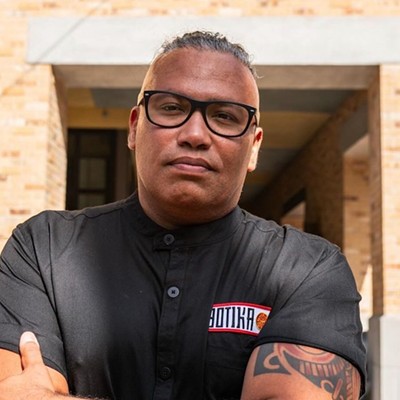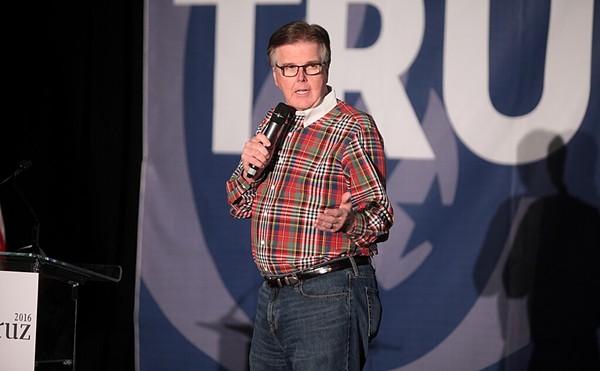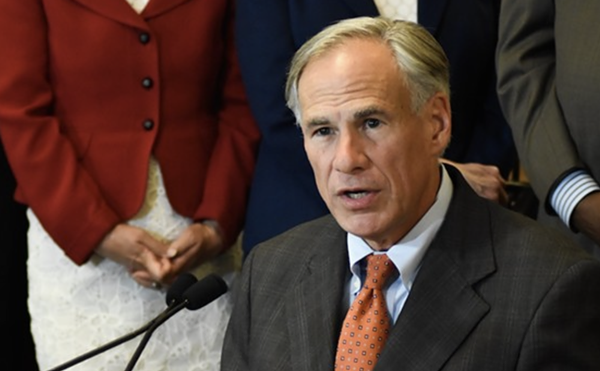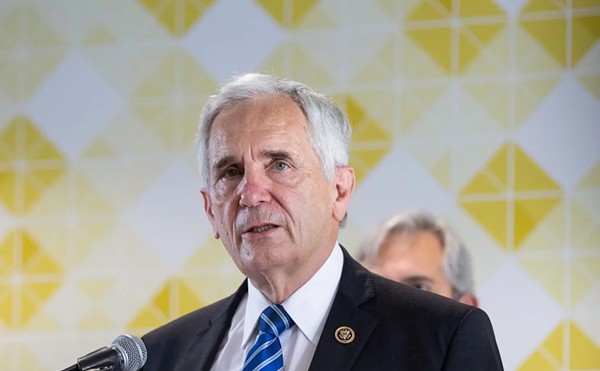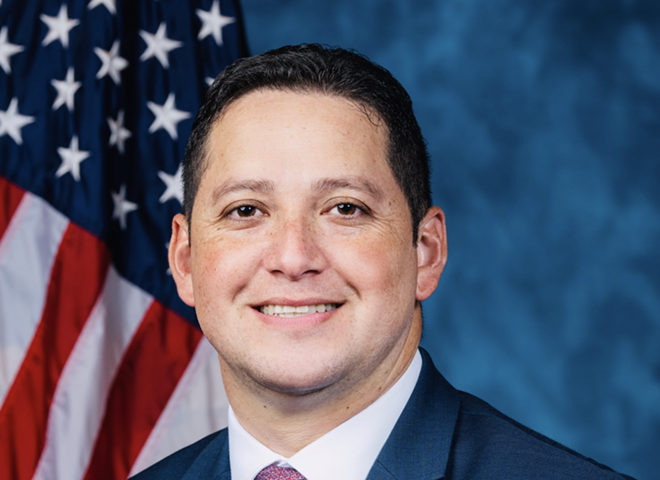
WASHINGTON — U.S. Rep. Tony Gonzales’ primary challengers want to prove that moderate congressmen aren’t welcome in the border district anymore.
Gonzales is running for reelection in the 23rd congressional district for the first time since the Texas GOP censured him for breaking with the party over his positions on gun control and border security. The rebuke against one of their own means the state Republican Party doesn’t have to spend money to help defend his incumbency.
Among those running against Gonzales is Julie Clark, the former Medina County Republican Party Chair who was responsible for the measure to censure him. Also running: Brandon Herrera, a Second-Amendment activist on YouTube; Victor Avila, a former Immigration and Customs Enforcement Homeland Security Investigations agent; and retired Border Patrol agent Frank Lopez, who ran the campaign of Gonzales’ 2020 far-right primary opponent Raul Reyes.
The candidates largely agree that Gonzales doesn’t represent the values of the massive, sparsely populated district, which stretches from San Antonio to El Paso. They point to Gonzales’ repeated refusal to play ball with his other Texas Republicans in the U.S. House on issues ranging from border security to the speaker of the House.
But Gonzales, who declined requests for an interview and did not respond to a list of emailed questions, has a huge financial advantage — raising $2.6 million last year. Clark has a lead among Gonzales’ challengers, having raised $843,000 last year — however, almost all of that came from money she personally gave to her campaign. Herrera is closely following Clark with more grassroots support. Lopez is in last, raising just over $7,000.
Another reason for confidence from Gonzales — district voters have rewarded moderates in the past. Gonzales succeeded U.S. Rep. Will Hurd, a centrist Republican who became known for working across the aisle with his Democratic El Paso counterpart, Beto O’Rourke. And he narrowly defeated Reyes’ grassroots campaign in 2020.
But Gonzales isn’t taking the primary for granted.
“I’m going to kick their ass no doubt, but it’s going to cost me time, money, energy, effort,” Gonzales said in an interview last year after the censure motion. “Instead of fending off against the Democrats here, I have to go drown crazy Republicans.”
Clark, Herrera and Avila said getting rid of Gonzales was as much a motivation as representing the district in Congress. If the primary goes to a runoff — a likelihood with this much money split among the candidates — Avila said he would back whoever isn’t Gonzales. Clark did not make the same commitment when asked.
The majority Hispanic district was a more competitive seat before redistricting ahead of 2022, voting for former President Donald Trump by 1.7 percentage points. But with new lines, the district would have voted for Trump by 7.1 points.
Unseating Gonzales
The state Republican party censured Gonzales in March of last year, citing his votes in favor of same-sex marriage legislation, his refusal to back a House rules package negotiated between former House Speaker Kevin McCarthy and several far-right Republicans, his objection to a hardline border proposal introduced by U.S. Rep. Chip Roy and his support for bipartisan gun safety legislation.
Gonzales stood out among the rest of the delegation on all of those points. He was the only Texas Republican in the House to support marriage equality legislation and the Bipartisan Safer Communities Act last year. The gun safety bill, brokered largely by Sen. John Cornyn, was the first major gun safety legislation in decades and passed in the wake of the Robb Elementary shooting in Uvalde, which is in the district. It brought millions in federal money to state and local governments, including Uvalde, to shore up mental health and gun safety initiatives.
Gonzales was also the only Republican in the U.S. House to vote against a rules package finalizing McCarthy’s speakership last year. The package convinced far-right members of the House to support McCarthy’s bid for speaker, but Gonzales felt it was too draconian, particularly on budget reductions. He feared at the time that the budget reduction targets would harm defense spending.
And on the border, his feuding with Roy on his border package irritated several members of the Texas delegation, who were frustrated to see divisions within their group broadcast to the world. The bill would have expelled migrants once detention capacity in the country was full. Gonzales called Roy’s bill “un-American” and “un-Christian”, claiming those expulsions would amount to eliminating asylum. Roy fiercely denied that he was against asylum.
The two ended up working together on a hardline border bill that the entire House Republican conference passed last year. But the acrimony left a bad taste in many members’ mouths.
Gonzales hinted last year that Clark launched the censure to launch her own political aspirations. “It doesn't take a rocket scientist to figure out there's some politics there,” he said.
Clark said that she was reflecting the will of the voters and had no desire to run for office when she launched the resolution.
“Once I was elected [county chair], I had a flood of complaints coming in not only in my county, but across the district on Tony's voting results, and they wanted something done about it,” Clark said. “I didn't even know what a censure was.”
Herrera made a name for himself as a YouTuber under the moniker “the AK Guy.” On his YouTube channel, which has over 3.23 million subscribers, he said he was running to defend gun owners from federal legislation, such as the Bipartisan Safer Communities Act.
Herrera has raised over $812,000, with $640,000 coming from individual contributions. In a Congress filled with politicians who try to be social media influencers, he would be among the budding field of social media influencers trying to become politicians.
“It’s like once they win their first election, they feel untouchable in the primary,” Herrera said in a video explaining his candidacy and referencing Gonzales, whom he called an “establishment Republican”. “We have to remind them that if they fail to uphold their oath to defend the Constitution, we will primary them, we will campaign against them and we will win.”
Herrera did not respond to repeated requests for an interview.
It’s yet to be seen whether his national profile will translate to the district. A sizable portion of Herrera’s contributions come from out of the district and even the state. He announced his candidacy in Florida at the Young Americans for Liberty conference.
Herrera also is testing how a pro-gun message would fare in Uvalde’s district in the aftermath of Texas’ most deadly school shooting. Gonzales often cited representing the city as a motivation for his support for the gun safety bill and worked with the city government to ensure it received federal funds from the bill.
Herrera made headlines last December when he left an inactive explosive in an Uvalde restaurant at a campaign event, prompting San Antonio’s bomb squad to investigate. Herrera’s campaign later said the device was a spent shell that posed no safety risks. His campaign apologized.
Herrera also drew criticism for joking about veteran suicides, saying, “I often think about putting a gun in my mouth, so I’m basically an honorary veteran.”
Clark was among those critics.
“This is one of the largest veteran districts in the country,” Clark said. “I just can't even believe that someone would think that something like that is funny. My husband is a veteran.”
Avila does not have as much money, but he has key endorsements. He has reported raising just over $91,000 by the end of last year. He also has more grassroots support, with individual contributions to his campaign more than tripling those Clark has received .
He has the endorsements of Tom Homan, former director of ICE under Trump, and Joe Arpaio, the former sheriff of Arizona’s Maricopa County famous for his hardline border enforcement that made him subject to a series of civil rights lawsuits.
Both Avila and Clark expressed interest in joining the Freedom Caucus and placed securing the border at the top of their agendas.
Gonzales says 'Come and take it'
Gonzales blows his challengers out of the water in fundraising, gaining the support of a host of prominent business interests in his district. He raised well over $2.6 million last year, finishing 2023 with over $1 million in cash on hand. His donors include corporate interests in the fossil fuel, telecommunications and agriculture industries.
Gonzales’ relationship with the business community has not always been smooth sailing. He returned $5,800 in campaign donations last cycle to El Paso business leader Woody Hunt after Hunt tried to push for keeping more of the city in Rep. Veronica Escobar’s district. Gonzales blasted Hunt at the time, calling his business “corrupt” and threatening to investigate it.
“I don’t care who you are. If I feel I’ve been wronged … I’m going to push back. I’ve done that over and over again. And guess what, I’m not going to stop,” Gonzales said in an interview last year.
Gonzales appears to have made amends with Hunt, who gave him about $1,800 last August for his primary effort. Hunt has given to members of both parties in the past. He declined to comment.
Gonzales also has garnered some good will in parts of his district in the wake of the Robb Elementary shooting. After the bipartisan gun safety bill passed, Gonzales brought in millions to Uvalde to bolster mental health resources, then-Mayor Don McLaughlin said. McLaughlin resigned to run for state representative.
“Every politician gets up there and talks about mental health, we're gonna do this, and we're gonna do that. But none of them put up. They all talk a good game. But when it comes time to put up, they're nowhere to be found,” McLaughlin said in an interview last year. “[Tony] is behind what we're trying to do here. And, you know, he's tried to open as many doors as he can.”
“Everything we've asked for, he's tried to make available to us,” McLaughlin said.
The Texas GOP censure motion has also in some ways helped raise Gonzales’ profile to the ranks of other centrist pragmatists. Similarly centrist minded lawmakers, including Sen. Kyrsten Sinema, I-Arizona, and Henry Cuellar, D-Laredo, have praised him as a workhorse.
He has also launched himself on national border priorities among conservatives. Gonzales has led numerous Republican delegations to the border in highly publicized tours.
Gonzales was also a critical supporter of impeaching Homeland Security Secretary Alejandro Mayorkas. He became one of the most vocal supporters of the effort last year, working with House Republican leadership to convince more moderates to vote for impeachment. Far-right Rep. Marjorie Taylor Greene, R-Georgia, introduced the impeachment resolution, which passed the House last week on a party-line vote. A handful of moderate Republicans opposed the resolution.
But critics say his efforts touting his border record aren’t consistent with his record at home.
“He comes with the media and he, you know, brings all these senators and congressmen and it's all a show,” said Sandra Sassano, Republican Party chair for Maverick County, which includes Eagle Pass.
When asked for an interview about his working relationship with Gonzales, El Paso Mayor Oscar Leeser responded with a terse email.
“I know Rep. Gonzales has been to El Paso, but he has never reached out to me. I have never met him. As such, the working relationship is non-existent,” Leeser wrote. “As Mayor of the sixth largest city in Texas — which contains part of the district he represents — I would welcome establishing a collaborative working relationship with him or anyone holding that elected position.”
Leeser has previously had the endorsement of the Texas Democratic Party, though the mayorship is nonpartisan. Leeser’s office declined to have a full interview.
“Money isn't everything. Most people in his position probably think that it is, but it isn't. So I go back to the values,” Sassano said. “Does he represent my values? Absolutely not.”
This article originally appeared in the Texas Tribune.
The Texas Tribune is a member-supported, nonpartisan newsroom informing and engaging Texans on state politics and policy. Learn more at texastribune.org.
Subscribe to SA Current newsletters.Follow us: Apple News | Google News | NewsBreak | Reddit | Instagram | Facebook | Twitter| Or sign up for our RSS Feed


